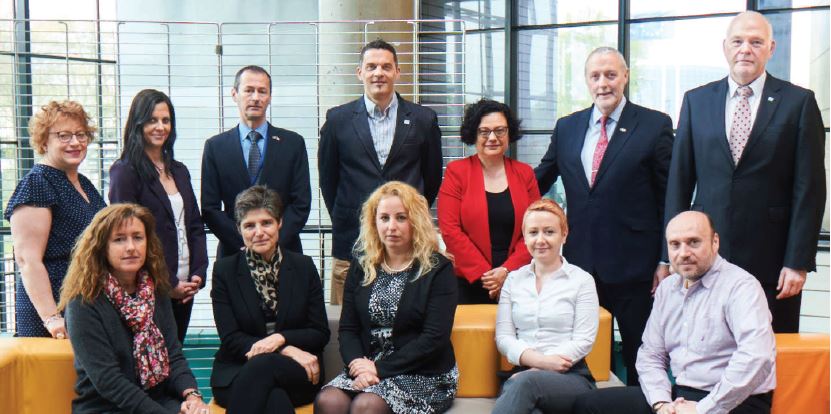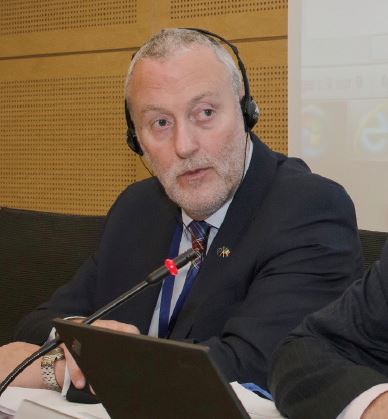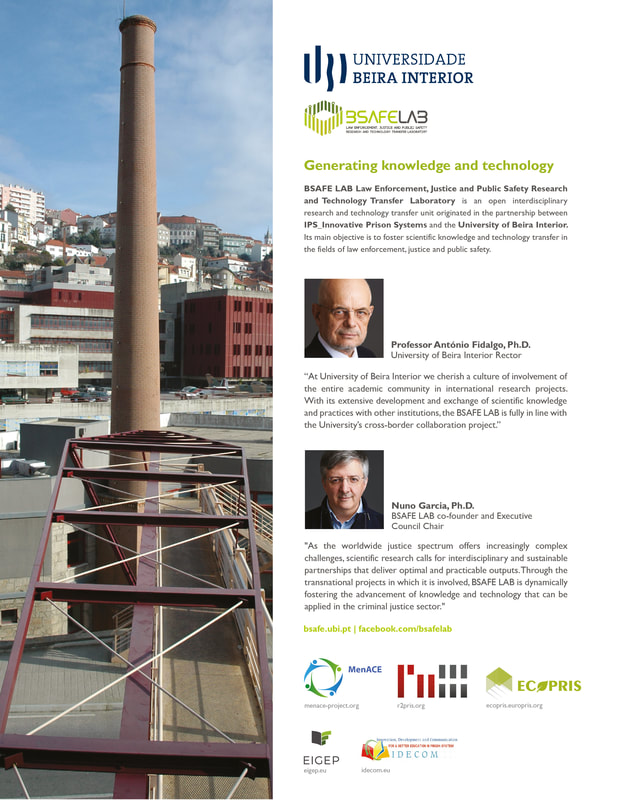// Interview: Vivian Geiran
President of the Council for Penological Cooperation (PC-CP) of the Council of Europe and Director of the Irish Probation Service
About the Council for Penological Cooperation
The Council for Penological Cooperation (PC-CP) was founded in 1980 by the Committee of Ministers of the Council of Europe (CoE), as an advisory body to the Steering Committee on Crime Problems (CDPC). For many years it comprised seven independent members elected by the CDPC in their personal capacity. However, in 2011, after the adoption of CM/Res(2011)24, the PC-CP has become a subordinate body to the CDPC, holding one plenary meeting per year with its 47 member states.
It is composed by a working group of nine members who meet four times a year and who are elected, in their personal capacity, by the CDPC. These are high-level representatives of prison administrations or of services entrusted with the implementation of non-custodial sanctions and measures, or researchers, or other experts having a thorough knowledge of penological questions.
The broad aim of the PC-CP is to advance the Council of Europe goals through the development and advancement of standards in the field of prisons, probation and community sanctions and measures.

The PC-CP activities include the following of the developments and the assessment of the functioning and implementation of the CoE standards; the preparation of binding and non-binding instruments, reports and opinions on penological matters; the preparation of the Conference of Directors of Prison Administration and of the annual penal statistics (SPACE I and SPACE II).
Some of the most important standard-setting texts drafted by the PC-CP include the European Prison Rules, the European Rules for Juvenile Offenders, the European Code of Ethics for Prison Staff, the Recommendation concerning foreign prisoners, the Recommendation on Electronic Monitoring, and the European Rules on Community Sanctions and Measures, the latter being 2017-update to a recommendation that dated back to 2000. Additionally, one of the most recent results of this working group’s work was the publication of a compendium of key texts relating to prisons and community sanctions and measures.
//
JT: What importance does the Council for Penological Cooperation (PC-CP) assume, and how does it interconnect with other organisations?
VG: I believe the PC-CP plays a vital role in the generation, the development and dissemination of standards in probation and prison work, and not just developing those standards but working towards their adoption and implementation across the Member States.
We are very well connected, in what we do, with a multiplicity of units or divisions within the Council of Europe itself; so, for example, the international cooperation area, the CPT, the Committee on the Rights of the Child, and so on.
We are also connected with relevant EU and UN bodies for example, and very importantly, with a number of network bodies operating in the area of prisons and probation, such as the Confederation of European Probation (CEP) and EuroPris, depending on what issues we’re working on.
For example, at the moment, because of our current work programme, we have a very fruitful connection with the European Forum for Restorative Justice and the “Children of Prisoners Europe” network.
We are also connected to the research and expert community that is operating in the field of prisons and probation, and last, but by no means least, with the Directors-General of prison and probation across Europe. They are a very important group individually and collectively, in terms of what we do and how we do it.
The whole area of radicalisation to violent extremism is a very important one and so is the issue of overcrowding in prisons.
JT: What are the most pressing challenges/problems that are on the table on this moment for the PC-CP?
VG: Right now, we are focused on completing our current work programme, and, specifically, that involves the completion of guidelines on the use of restorative justice in probation and prison work and also a recommendation document on the children of prisoners.
On an ongoing basis, we organise the Conference of Directors of Prisons and Probation and the collection of the SPACE (penological) statistics. We are also updating the Commentary to the European Prison Rules and then, for the future, our main focus, as always, is on further developing and evolving our work programme.
The whole area of radicalisation to violent extremism is a very important one. So is the issue of overcrowding in prisons. The latest available statistics indicate that around a third of the Council of Europe Member States report problems with prison overcrowding.
And, similarly, for a number of Member States, radicalisation is an ongoing and a serious problem. So, in these and all the challenges we face across the different jurisdictions, the PC-CP and the Council of Europe stand for and promote human rights, the rule of law, and best practice in prisons and probation.

JT: There’s a PC-CP guidelines’ document, which has been issued in March 2016, regarding the prevention of radicalisation and violent extremism in prison and probation settings.
Is a 5-page guidelines’ text enough to deal with the present phenomenon of radicalisation? And in what ways have member states reacted to these guidelines?
VG: The guidelines’ document provides a high-level ‘picture,’ which focuses on the foundation stones of how we respond to this issue. In addition to it, though, we also completed and published, last year, a Handbook on Radicalisation, which is quite comprehensive and much longer.
I think it is a useful and user-friendly resource for both prison and probation management, staff, and justice administrations, in addressing this issue. Our responses need to be based – as with all of the Council of Europe documents – on the respect for human rights and the rule of law.
The Handbook is more detailed and drawn from up-to-date experience, research and the knowledge of the experts that were involved in that drafting process.
It is also focused in very practical ways on how Member States and their prison and probation systems can respond more effectively to radicalisation, based on sound research and good practice. These and all PC-CP documents are available at www.coe.int
Member States, prison and probation organisations have welcomed the Guidelines and the Handbook. In relation to their implementation, in practice, it probably depends to some extent on the size of the actual problem in different Member States. So, countries that have a big problem in this regard tend to take this a lot more seriously and try to deal with it proactively.
Good interagency cooperation, particularly among justice agencies (prison, probation, courts, police, prosecutors, and so on), including effective information sharing and joined-up case management, is essential in addressing the problem of radicalisation. I think that’s what is required, to begin with, and then to build on that cooperation, with effective and evidence-informed interventions, based on solid values and principles.
JT: The last meeting of the CDPC sub-group on prison overcrowding (in June 2017) concluded that a successful reform needs to engage all actors in the penal justice chain and, consequently, it was decided to suggest to have a high level Conference on prison overcrowding in 2018 or 2019.
What are your views on how successful criminal justice reform can be accomplished, and how will the PC-CP support and be involved in the initiatives to address the overcrowding problem?
VG: The Council of Europe and its bodies – including the PC-CP – play a crucial role in these issues, particularly ones like prison overcrowding for example.
From the very outset of exploring any challenges, it is vital to have good statistics and data. This is achieved through the SPACE I and II statistics, for example. It is fundamental that we have good data and analysis on which to build our policies and our responses, to any issue both nationally and internationally. So, the Council of Europe’s SPACE statistics are really important for that reason.
I also believe there is a value in bringing all the collective thinking on prison overcrowding together: I was part of the Council of Europe Working Group that is now considering how to make the best use of the White Paper on Prison Overcrowding. I believe the White Paper is very sound, is very strong, and it really highlights the need for coordinated responses to this issue. And there is a need for coordinated effort in any Member State in order to improve the situation regarding prison overcrowding.
There is also a fundamental need for strong leadership, not just at the political level but at the level of the heads of organisations like the prison and probation services.
The issue of prison overcrowding is particularly challenging to tackle, because, as the White Paper highlighted, there is the need to involve all elements of the criminal justice system, from the police, to prosecutors, to courts, probation, and other organisations in order to make a real, effective and lasting change.
There is evidence from a number of countries that such positive change is possible. For example, Italy, and other Member States over recent years, took a very determined approach to dealing with this problem and did reduce their prison population significantly. But prison numbers can be like a pendulum. They sometimes go down, but, if you are not constantly dealing with the underlying issues, the numbers can go back up again.
I do also think the proposed multi-stakeholder conference on prison overcrowding would be a good next step and could deliver a positive impetus to address this challenge.
And other events, like the Conference of Directors of Prison and Probation, that the PC-CP organises, provide very valuable opportunities to share the learning of how to deal with these problems and challenges.

(CDPC) of the Council of Europe November 2017
JT: To what extent does your position within the PC-CP influence your job as the Director of the Irish Probation Service and vice versa?
VG: Hugely! I think the influence has been really strong in both directions. I have always been conscious – in all my thirty years working in probation – of the need to have good professional standards.
Equally, from my training as a social worker, I always felt strongly about that need. So, I was really delighted and honored to have the opportunity to be nominated and then be elected onto the PC-CP to contribute to the development of standards at the European and international level, and to bring my training and experience, particularly as Director of Probation, to that.
My understanding and appreciation of those international professional standards are now stronger than ever. I constantly, in Ireland and elsewhere, use every opportunity to try and contribute to that development on an ongoing basis, because I know we deliver better services when we have good standards, implement evidence-informed practice, and hold ourselves to account for delivering these effectively.
There is a bright future for corrections in Europe, but it will not happen by chance: it takes leadership and courage.
JT: What do you think the future will bring to the correctional systems of the Member States of the Council of Europe?
VG: I tend to be optimistic and I think that there is a bright future for corrections in Europe. Nevertheless, the bright future will not happen by chance: it does take leadership and courage to ensure that future developments will be positive.
I would hope that prison numbers across Europe would continue to fall – the most recently published SPACE statistics show that they fell by a small percentage rate, in the last report. I would hope that that would continue, on the basis that prison in itself is not a good thing.
It is an essential sanction for those who need it because of serious offending, but it is not a good use of resources, nor is it a good place to send people for rehabilitation, even though it is necessary for the most serious offenders.
Equally, when people ask me about possible falls in the level of the probation population across Europe, that does not concern me too much; I would actually feel it is better to get the numbers on probation and in prison right, so that the right people are in prison, the right people are on probation and that neither type of sanctions are used indiscriminately or unnecessarily.
Most importantly, I hope we can ensure that those of us working in probation and prisons can always strive to ensure that we implement what works, through professional staff, and based on human rights principles and values, so as to ensure the best outcomes, particularly in increasing desistance from offending, and fewer victims.
And I do hope, in the future, that we will continue to develop the good international connections that we have, so that we can continue to share the learning emerging in many different countries and different ways, and, ultimately, work together more, to make what we do better, so that we create safer, fairer and more inclusive communities across Europe as a result.
//
Vivian Geiran was the Chair of the Council for Penological Cooperation (PC-CP) between January 2015 and December 2018, and he is the Director of the Irish Probation Service since 2012. He has held several posts at the Probation Service in Ireland since 1987 when he first started as a probation officer. He has filled a variety of roles at different levels up to his appointment as Director of Operations in 2006. He’s is a professionally qualified social worker, and prior to joining the Probation Service, he worked as a local authority social worker in Dublin. He was also a co-founder and first joint-editor of the Irish Probation Journal.
Advertisement



